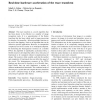Free Online Productivity Tools
i2Speak
i2Symbol
i2OCR
iTex2Img
iWeb2Print
iWeb2Shot
i2Type
iPdf2Split
iPdf2Merge
i2Bopomofo
i2Arabic
i2Style
i2Image
i2PDF
iLatex2Rtf
Sci2ools
103
Voted
JRTIP
2007
2007
Real-time hardware acceleration of the trace transform
The trace transform is a novel algorithm that has been shown to be effective in a number of image recognition tasks. It is a generalisation of the Radon transform that has been widely used in image processing for decades. Its generality—allowing multiple functions to be used in the mapping—leads to an algorithm that can be tailored to specific applications. However, its computation complexity has been a barrier to its widespread adoption. By harnessing the heterogeneous resources on a modern FPGA, the algorithm is significantly accelerated. Here, a flexible system is developed that allows for a wide array of functionals to be computed without re-implementing the design. The system is fully scalable, such that the number and complexity of functionals does not affect the speed of the circuit. The heterogeneous resources of the FPGA platform are then used to develop a set of flexible functional blocks that can each implement a number of different mathematical functionals. The comb...
Related Content
| Added | 16 Dec 2010 |
| Updated | 16 Dec 2010 |
| Type | Journal |
| Year | 2007 |
| Where | JRTIP |
| Authors | Suhaib A. Fahmy, Christos-Savvas Bouganis, Peter Y. K. Cheung, Wayne Luk |
Comments (0)

